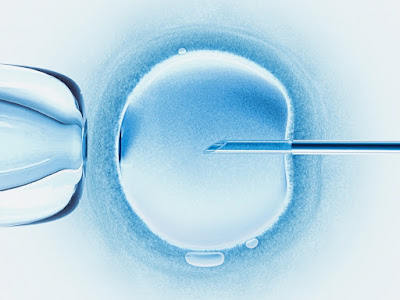The
roller coaster of emotions that comes with fertility treatments literally make
you feel like you’re losing your mind at times. Keeping these emotions in check
is key — but incredibly difficult. One day you’re hopeful and excited about
trying to get pregnant, telling yourself that this cycle will be the cycle. You
happily take your injections and suppositories because you know this is what
will bring you a baby. Then you’re nervous at your appointment to get pregnant
because you know there’s no guarantee. Not even when you’ve done everything
you’re supposed to.
Such
is the case of Mrs. Pelumi Oguntola, who battled infertility for 5 years, until
her doctor counseled her to go for IVF and she gave birth to a set of twins
after two attempts. Oguntola, it was discovered, got married in her late
forties because she was busy pursuing her education as well as her career.
IVF
literally means “the fertilization of eggs with sperm in glass,” which
translates to fertilization outside of the body in the laboratory. There are
two types of IVF: (1) stimulated cycle IVF, and (2) Natural Cycle IVF (NCIVF).
Since its discovery, more than 4 million children have been born using IVF.
Age
or menopause may no longer be a barrier to a woman having a child, thanks to
oocyte cryopreservation, which is available in the country. Human oocyte
cryopreservation (egg freezing) is a process where a woman’s eggs (oocytes) are
extracted, frozen and stored to be used when she is ready to become pregnant.
The
‘frozen’ eggs can be thawed, fertilized, and transferred to the uterus as
embryos. The cooling of cells and tissues to sub-zero temperatures stops all
biological activities and preserves the eggs for future use. Two years ago,
Nigeria recorded a success story of a baby born through this process and ever
since, there have been so many success stories.
A world-class
gynaecologist and fertility specialist, Dr.
Michael Ogungoka, Managing Director of The
Hope Valley Fertility Clinic, a hospital which started IVF in Nigeria in
2001 has till date recorded about 2,600 deliveries from its various procedures
in the Assisted Conception Technology field, said: “The introduction of this
technique completely changed – and geatly improved our ability to treat even
the most difficult cases of infertility, many of which were previously untreatable.”
The ability
to freeze and subsequently thaw and transfer embryos has significantly improved
the feasibility of IVF use. Thus, IVF has become the final solutions for most
fertility problems, moving from tubal disease to male factor, idiopathic
sub-fertility, endometriosis, advanced maternal age, and an ovulation not
responding to ovulation not responding to ovulation induction. When
analyzing success rates in fertility treatment, it often turns out that the stated
values refer
to cumulative pregnancy rates. But what exactly is meant by this type of pregnancy
rate?
According
to Dr. Ogunkoya, cumulative is derived from the Latin word “cumulare” (to accumulate).
The cumulative pregnancy rates take
account of all pregnancies achieved by IVF, following several successive embryo
transfers. Irrespective of whether these embryos derived from so-called “fresh
cycles” (the fertilized oocyst develops inside an incubator and is usually transfered
to the uterus on the fifth day of embryonic development) or from “cryocycles”
(for some reasons, the growing embryo can be frozen/cryopreserved, the frozen-thawed
embryo can then be used in a future transfer).
The cumulative
pregnancy rate also implies that the likelihood of getting pregnant increases
with the number of already received therapy cycles. Particularly in case where
the first attempt has failed, the couple concerned wants to know what the
prospects are for achieving a pregnancy – either by undergoing another cycle of
ovarian stimulation (carefully monitored administration of certain hormones
designed to encourage the ovaries to produce a greater number of oocytes) or
where appropriate, by transferring a frozen-thawed embryo from a previous IVF treatment
cycles.
In the
words of Dr. Michael Ogunkoya, “women can have their eggs frozen for so many reasons. Firstly, some
women opt for this procedure because they are not ready to have a baby, while
others are undergoing treatment for an illness that requires chemotherapy or
therapy to part of the body near the ovaries.”
The earliest
reasons for this is that for instance, a woman has undergone IVF and she has
many eggs collected, she will use some and might decide to store the rest. “That is quite beneficial
because it implies that whether the one she has done is successful or not,
anytime she wants to get pregnant again, you don’t have to dose her up with
fertility drugs; just go to where the eggs are stored and take some and
fertilize them with the partner’s sperm.
“The
third reason is the issue of women saying they are not ready to get married,
that they still want to pursue their education or their career, and age is
catching up on them. She can store her eggs or indeed her ovary at an earlier
age. The reason is when a woman gets to 40 years upwards; she will be
struggling to bear children for a long time which can last till about 10 years.
So, when
she is ready, she could just approach the doctor with her husband and indicate
her readiness and things will be sorted out. Take for instance in Europe, the
most women, not just because of their
age, but because they have not met the right partner, store their eggs or
ovaries for the same reason.”
The ovary
eggs of a woman, Dr. Ogunkoya said, can be stored at any age. “No age barrier, as long as
those needs are there and no negative stories at all.”
Feel free to come to our fertility clinic @
THE HOPE VALLEY FERTILITY CLINIC
Plot 31,
Block 113,Gbemileke Akinsonwon Street, Opposite Treasure Garden, 3rd or Ikate
Roundabout Lekki Phase 1,Lagos-Epe express Way, Lagos
08033069466
08033069466



No comments:
Post a Comment